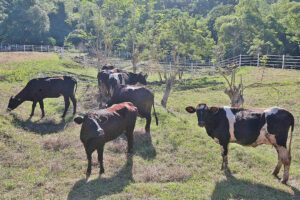THE Department of Agriculture (DA) said it will seek to expand production of ruminant animals like cattle, carabao, goat, and sheep.
“We are happy to contribute to the call of President Ferdinand R. Marcos, Jr. to produce more food and to ensure our country’s food sufficiency, while at the same time, helping boost ruminant production,” DA Climate Resilient Agriculture Office Program Director Alicia G. Ilaga said.
According to the department, the Philippines had an estimated 2.6 million head of cattle inventory as of January. The annual beef requirement is the equivalent of 2 million head, based on annual per capita consumption of 3.15 kilograms by a population of 110 million.
“This means that, if we do not (intervene), we will run out of cattle. That’s why it is good to start this project in our villages,” Adelaide River Farms co-owner Arnel T. Corpuz said.
Under the project, beneficiaries and resident farmers in selected reintegration sites will be immediately engaged fatten cattle before they are brought to market.
“They will also be engaged in forage development to ensure feed supply for their livestock and to help improve their income by assuring maximum weight gain for their livestock. For the next phase of the project, the beneficiaries will be engaged in breeding, which will allow the production of cross breeds which can help provide high-value, high- quality, and low-cost beef products to the market,” the DA added.
“Villages were established to serve as sites where current and future beneficiaries can be reintegrated into. These sites, called climate-resilient villages, are being taught various climate-resilient agriculture practices and technologies to help them manage their climate risks and pursue sustainable, climate-resilient livelihoods and enterprises toward increased productivity and income,” the DA said. — Luisa Maria Jacinta C. Jocson
